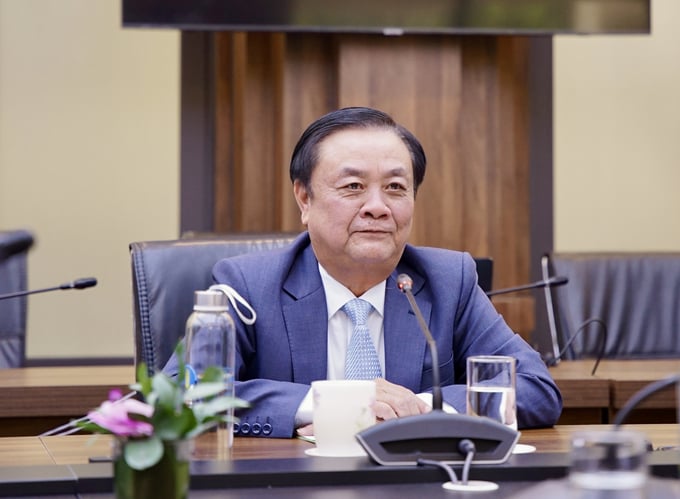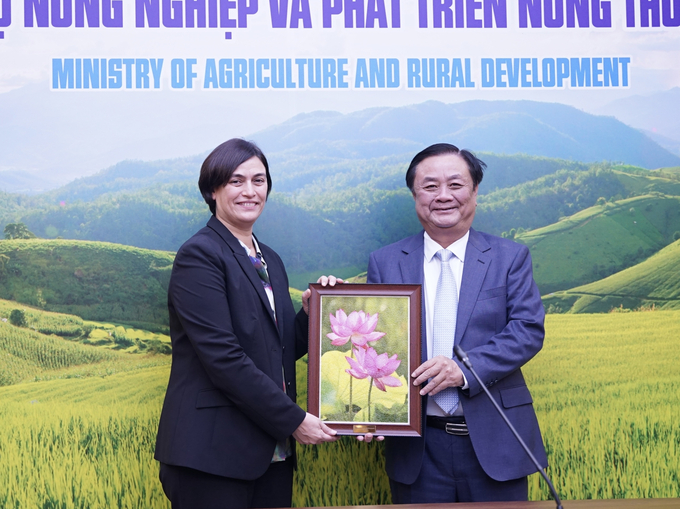May 20, 2025 | 02:17 GMT +7
May 20, 2025 | 02:17 GMT +7
Hotline: 0913.378.918
May 20, 2025 | 02:17 GMT +7
Hotline: 0913.378.918

Minister of Agriculture and Rural Development Le Minh Hoan held a meeting with World Bank's representatives on May 31. Photo: Linh Linh.
Minister of Agriculture and Rural Development Le Minh Hoan held a meeting with Ms. Mona Sur, Practice Manager for Environment, Natural Resources and the Blue Economy in the East Asia and Pacific Region, and Ms. Kathy Whimp, Operations Manager for the World Bank in Vietnam, on May 31.
The Minister conveyed his gratitude for the collaboration and dedication of Ms. Mona Sur in her roles at the World Bank, which have played a significant role in the transformation of Vietnam's agriculture sector and the improvement of farmers' livelihoods and rural communities.

Ms. Kathy reported that the Mekong Delta Integrated Climate Resilience and Sustainable Livelihoods Project (WB9), which is nearing completion, has attained certain accomplishments.
Ms. Kathy Whimp, expressed the WB's recognition and strong appreciation for the collaboration with the Ministry of Agriculture and Rural Development (MARD) in recent times.
Ms. Kathy reported that the Mekong Delta Integrated Climate Resilience and Sustainable Livelihoods Project (WB9), which is nearing completion, has attained certain accomplishments. Currently, the Mekong Delta Integrated Climate Resilience and Transformation Project (WB11) is in the process of being prepared.
Ms. Mona Sur presented further favorable outcomes resulting from the implementation of WB9 in the provinces of the Mekong Delta during the meeting.
The initiative, which was started over ten years ago, was a true pioneer in developing concepts related to coexisting with the environment and adjusting to the effects of climate change.
"I am very amazed by the transformative improvements in the Mekong Delta's livelihood as a result of this project. We have observed numerous instances where farmers have been assisted in transitioning from rice cultivation to a combination of rice and shrimp farming or engaging in agricultural practices in mangrove regions alongside shrimp and crab farming. In addition, the support has been expanded to include the development of more environmentally-friendly infrastructure. This will serve as a solid basis for the forthcoming WB11 project," Ms. Mona declared.

The Minister conveyed his gratitude for the collaboration and dedication of Ms. Mona Sur.
As per the WB official, the WB9 project is anticipated to be completed by the end of June, with 98.6% of the IDA loan monies, amounting to 208 million USD, being distributed. The project had a positive impact on about 1.2 million farmers by enhancing agricultural methods and water management on a total area of 200,000 hectares. The World Bank recommended that the Ministry of Agriculture and Rural Development (MARD) carry out an assessment to ensure a thorough conclusion of the project.
Minister Le Minh Hoan stated that both localities and professionals have shown great admiration for the achievements of WB9. In order to meet the deadline of June 30, specific technical activities must be finished. The Ministry has allocated units to generate communication scenarios aimed at enhancing the dissemination and efficacy of WB9 for the Mekong Delta, in accordance with the principles outlined in Government Resolution 120/NQ-CP regarding the sustainable development of the Mekong Delta in response to climate change.
Minister Le Minh Hoan stated that this marks the initiation of perpetuating the principles of the project, extending them to other initiatives, and implementing strategies to revolutionize agriculture in the Mekong Delta.
During the discussion with the World Bank representatives, the leader of the Ministry of Agriculture and Rural Development (MARD) highlighted the focus on prioritizing the well-being of individuals, particularly farmers, when it comes to investment projects in the Mekong Delta and other regions. The Minister anticipates that farmers would persist in receiving advantages from facilities such as embankments, anti-erosion barriers, and pumping stations even after the projects conclude.
"The rice-shrimp, rice-fish, and other climate-resilient agricultural models have demonstrated to farmers that, despite the difficulties posed by climate change, they can endure and thrive on their land with the assistance, resources, and technical guidance provided by international institutions, such as the WB," stated Minister Le Minh Hoan.
Based on this premise, the leadership of MARD proposed that future collaborations between the Ministry and the WB should enhance the involvement of farmers or farmer groups to ensure successful dissemination. This is also in line with the Ministry's strategy of augmenting farmers' understanding and bolstering their capability in the project regions through the implementation of both physical and non-physical measures.
Translated by Dieu Linh

(VAN) This was the assessment shared by experts at the workshop titled 'Assessing the Role and Potential of Low-Emission Rice Production Systems in Vietnam,' held on the morning of May 19.

(VAN) Cai Rong Port is the fisheries control center of Quang Ninh, helping to monitor fishing vessels, combat IUU fishing, and remove the EC's 'yellow card'.

(VAN) The German Agricultural Society (DLG) explores the possibility of establishing a mechanization service center in Vietnam’s Mekong Delta to support farmers in accessing and utilizing advanced machinery.

(VAN) On May 16, the Department of Water Resources Management, in collaboration with the Food and Agriculture Organization of the United Nations (FAO), held a signing ceremony for the GEF-8 project document.

(VAN) Food safety, mechanization, vocational training, and market opening are key areas of cooperation expected between the Vietnamese Government and the Federal Republic of Germany.

(VAN) Deputy Minister Nguyen Quoc Tri also expressed his hope that Cuba will soon overcome its current challenges, attain food security, and further expand cooperation with Vietnam.

(VAN) The project contributes to enhancing the resilience of communities vulnerable to the impacts of climate change, with a primary focus on local women.